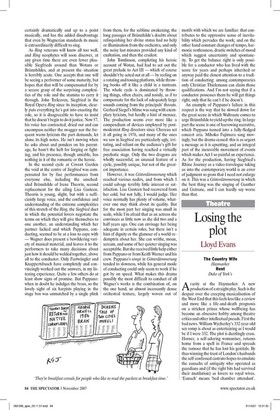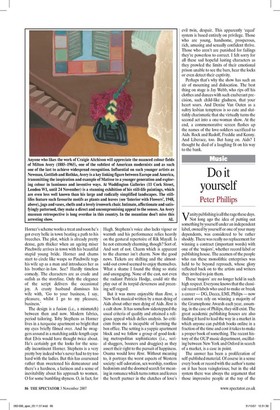Losing the plot
Lloyd Evans The Country Wife Haymarket Rent Duke of York's Ararity at the Haymarket. A new production of a straight play. Such is the despair over the creeping musicalisation of the West End that this feels less like a review and more like a life-and-death prognosis on a stricken prince whose wellbeing has become an obsessive hobby among theatre critics and other intellectual pseuds. First the bad news. William Wycherley's 332-year-old sex romp is about as entertaining as I would be if I were 332. The plot is dazzlingly crass. Horner, a self-adoring womaniser, returns home from a spell in France and spreads the rumour that he has lost his genitals. By thus winning the trust of London's husbands the self-confessed castrato hopes to emulate the eunuchs of antiquity who operated as guardians and (if the right bits had survived their mutilation) as lovers to royal wives. 'Eunuch' means 'bed chamber attendant'.
Homer's scheme works a treat and soon he's got every belle in town beating a path to his breeches. The plot, which is already pretty dense, gets thicker when an ageing miser Pinchwife arrives in town with his beautiful stupid young bride. Homer and chums start to circle like wasps so Pinchwife togs his wife up as a man and introduces her as his brother-in-law. See? Hardly timeless comedy. The characters are as crude and oafish as the storyline. Only the elegance of the script delivers the occasional joy. A crusty husband dismisses his wife with, 'Go to your business, I say, pleasure, whilst I go to my pleasure, business.'
The design is a fusion (i.e., a mismatch) between then and now. Modern fabrics, period tailoring. Toby Stephens as Horner lives in a turquoise apartment so bright that my eyes briefly filmed over. And he swaggers around in a matching ankle-length cape that Elvis would have thought twice about. He's certainly got the looks for the sexually incontinent Horner. Stephens is a very pretty boy indeed who's never had to try too hard with the ladies. But this has coarsened rather than sweetened his demeanour and there's a hardness, a laziness and a sense of inevitability about his approach to women. for some bumbling shyness. 0, in fact, for Hugh. Stephens's voice also lacks vigour or warmth and his performance relies heavily on the gestural repertoire of Rik Maya!!. Is he not extremely charming, though? Sort of. And sort of not. Charm which is apparent to the charmer isn't charm. Now the good news. Tickets are shifting and the almostsold-out crowd seemed to enjoy themselves. What a shame I found the thing so static and unengaging. None of the cast, not even the radiant Patricia Hodge, could stir the play out of its torpid cleverness and preening self-regard.
But it was more enjoyable than Rent, a New York musical written by a man dying of Aids about other men dying of Aids. Rent is a cult show. It has somehow sidestepped the usual criteria of quality and attained a religious appeal which defies analysis. So criticism from me is incapable of harming the box office. The setting is a yuppie apartment block and we follow a group of good-looking metropolitan sophisticates (i.e., serial shaggers, boozers and druggies) as they assert their right to the pursuit of happiness. Osama would love Rent. Without meaning to, it portrays the worst aspects of Western society: self-adoration, sex worship, rootless hedonism and the doomed search for meaning in romance which turns rotten and leaves the bereft partner in the clutches of love's evil twin, despair. This apparently 'equal' system is based entirely on privilege. Those who are young, handsome, prosperous, rich, amusing and sexually confident thrive. Those who aren't are punished for failings they're powerless to correct. I felt sorry for all these sad hopeful lusting characters as they prowled the limits of their emotional prison unable to see the bars, hear the locks or even detect their captivity.
Perhaps that's why the show has such an air of mourning and dislocation. The best thing on stage is Jay Webb, who rips off his clothes and dances with such exuberant precision, such child-like gladness, that your heart soars. And Denise Van Outen as a sultry lesbian temptress is so cute and sluttishly charismatic that she virtually turns the second act into a one-woman show. At the end, a commemorative screen flashes up the names of the love-soldiers sacrificed to Aids. Rock and Rudolf, Freddie and Kenny. And Liberace, too. But hang on. Aids? I thought he died of a laughing fit on his way to the bank.













































































 Previous page
Previous page